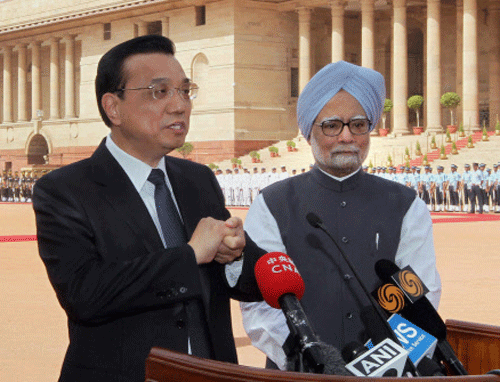
India on Monday signed eight pacts with China and even agreed to consider a bilateral Regional Trade Arrangement, as Chinese Premier Li Keqiang promised Prime Minister Manmohan Singh that Beijing would take measures to address New Delhi’s concerns over widening trade imbalance.
Singh conveyed to Li New Delhi’s concerns over India’s trade deficit with China as it grew steadily from $ 20.02 in 2010 to $ 28.93 in 2012. He sought “increased market access” for India’s exports and investments in China.
Prime Minister also sought “increased Chinese involvement in the vast opportunities” in India’s infrastructure and manufacturing sectors”.
Noting that both countries share a common interest in preventing protectionism and in an open multilateral trading system, the two sides in a joint statement issued after the meeting between Li and Singh “agreed to continue pushing forward the Doha Development Round, consider the potential for a bilateral Regional Trade Arrangement and review the state of negotiations on the Regional Comprehensive Economic Partnership”.
Ever since a Joint Study Group set up by the two countries had in October 2007 recommended that a Regional Trade Arrangement would be advantageous for both, China has been pressing India hard to start negotiation on the deal. New Delhi, however, has been resisting the pressure and in the past conveyed to Beijing that it could start negotiations on such an arrangement only if its Indian companies, particularly the ones in Information Technology and pharmaceuticals, are given greater market access to China.
Li on Monday promised Singh measures to address the issue of the trade imbalance. He assured Prime Minister of Beijing’s greater cooperation with New Delhi on pharmaceutical supervision including registration, for stronger links between Chinese enterprises and Indian IT industry and completion of phyto-sanitary negotiations on agro-products.
The two sides also agreed to enhance project contracting cooperation between the businesses of the two countries.
India and China had in 2010 set a new bilateral trade target of $ 100 billion to be achieved by 2015. Though the bilateral trade grew from $ 61.74 billion in 2010 to $ 73.9 billion in 2011, it declined to $ 66.57 billion in 2012.
Commerce Minister Anand Sharma and his Chinese counterpart Gao Hucheng signed an agreement to set up three working groups under the Joint Economic Group - Services Trade Promotion Working Group, Economic And Trade Planning Cooperation Group and Trade Statistical Analysis Group.
Sharma and Chinese Minister for General Administration of Quality Supervision also signed a Memoranda of Understanding on buffalo meat and fishery products, agreement on feed and feed ingredients between Agricultural and Processed Food Products Export Development Authority.